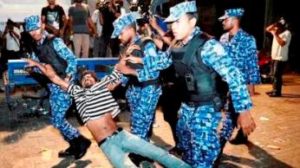Male/Colombo/New Delhi:
Former Maldives President Mohamed Nasheed on Wednesday justified the SOS for military intervention his country’s Opposition leaders had sent to Delhi, as India kept its cards close to its chest amid China’s call for resolving the issue internally.
“Saying ‘resolve things internally’ is akin to asking us to escalate the revolt, which can lead to chaos,” the exiled leader tweeted.
“Maldivians see India’s role positively: in ’88 they came, resolved the crisis, and left. They were not occupiers but liberators… This is why Maldivians look to India now,” he said, recalling then Prime Minister Rajiv Gandhi’s decision to send troops to Male during an attempted coup to overthrow its then President Maumoon Abdul Gayoom.
He had urged India on Tuesday to send an envoy backed by military to release political prisoners after the government of the Indian Ocean archipelago imposed emergency and arrested two senior judges.
Best known as an “A-list” holiday destination, the Maldives plunged into crisis last week after the Supreme Court quashed terrorism convictions against nine leading Opposition figures including the country’s exiled, first democratically elected President, Mohamed Nasheed.
Having defied the court ruling to release the detainees, President Abdulla Yameen declared an emergency and ordered security forces to seize control of the court and arrest the chief justice and another judge.
Nasheed, who was granted asylum by Britain after the government allowed him to leave jail for medical treatment abroad in 2016, sought Indian intervention to resolve the island nation’s most serious political crisis in years.

“On behalf of Maldivian people we humbly request India to send envoy, backed by its military, to release judges and pol. detainees.… We request a physical presence,” Nasheed, who is currently in Colombo, said in a Twitter post. He also urged the US to block financial transactions of Yameen’s government.
India remained non-committal on the appeal while expressing concern over the developments in the archipelago nation.
“We are disturbed by the declaration of a State of Emergency in the Maldives following the refusal of the Government to abide by the unanimous ruling of the full bench of the Supreme Court on 1 February, and also by the suspension of Constitutional rights of the people of Maldives,” the external affairs ministry said in a statement.
“The arrest of the Supreme Court Chief Justice and political figures are also reasons for concern. Government continues to carefully monitor the situation,” the statement added.
Addressing the nation on state television, Yameen said he had acted to prevent a coup, and suggested that the judges had chosen to side with his opponents because they were being investigated for corruption.
“I declared the state of emergency because there was no way to hold these justices accountable. This is a coup. I wanted to know how well planned this coup is,” he said.
As part of the crackdown, police also detained Yameen’s half-brother, Maumoon Abdul Gayoom, who had ruled the Maldives for 30 years until 2008 and now stands with the Opposition. Gayoom was detained at his residence along with his son-in-law.
Located near key shipping lanes, the Maldives have assumed greater importance after China began building political and economic ties as part of its so-called “String Of Pearls” strategy to build a network of ports in the Indian Ocean region.
Having historically held more clout in the islands, India has sought to push back against China’s growing influence there.
India, the US and Britain have urged Yameen to honour the rule of law and free the detainees.
Back in 1988, then Prime Minister Rajiv Gandhi had ordered troops to be sent to Male during an attempted coup to overthrow then President Maumoon Abdul Gayoom.


